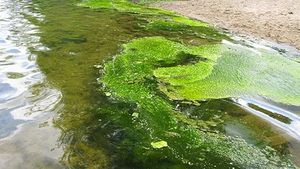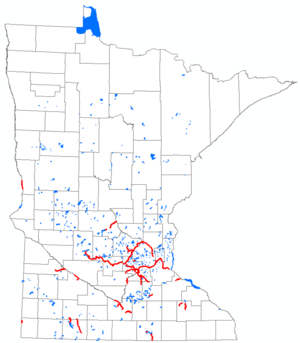
Phosphorus Revision as of 20:54, 26 December 2018 by Mtrojan (talk | contribs) (Created page with "thumb|300px|alt=image of eutrophication|<font size=3>Photo of a eutrophic lake, a result of excessive phosphorus loading.</font size> File:...")
The United States Geological Survey states: "Phosphorus is a common constituent of agricultural fertilizers, manure, [urban runoff], and organic wastes in sewage and industrial effluent. It is an essential element for plant life, but when there is too much of it in water, it can speed up eutrophication (a reduction in dissolved oxygen in water bodies caused by an increase of mineral and organic nutrients) of rivers and lakes." Phosphorus is an important contributor to surface water impairments in Minnesota, as illustrated in the map to the right.
This page provides links to other pages in this manual or other information related to phosphorus, phosphorus in stormwater, and managing phosphorus in stormwater.
Phosphorus in stormwater
This page provides information on phosphorus in urban stormwater, including a discussion of sources of phosphorus and management strategies for minimizing phosphorus loading from urban stormwater runoff to surface water.
Soil amendments to enhance phosphorus sorption
This page includes information on phosphorus-sorbing materials, including the following.
- iron filings (Erickson et al., 2012);
- steel wool (Erickson et al., 2007);
- native iron rich soils such as those in the Piedmont of the Mid and Southern Atlantic USA (Hunt et al 2012), or Krasnozem soil in Australia (Lucas and Greenway, 2011);
- Drinking Water Treatment Residuals (WTRs), which are a by-product of drinking water treatment and a source of aluminum and iron hydroxides (O’Neill and Davis, 2012a and 2012b, Hinman and Wulkan, 2012; Lucas and Greenway, 2011; Lucas and Greenway, 2010); and
- sorptive media (Imbrium) (Balch et al 2013)

